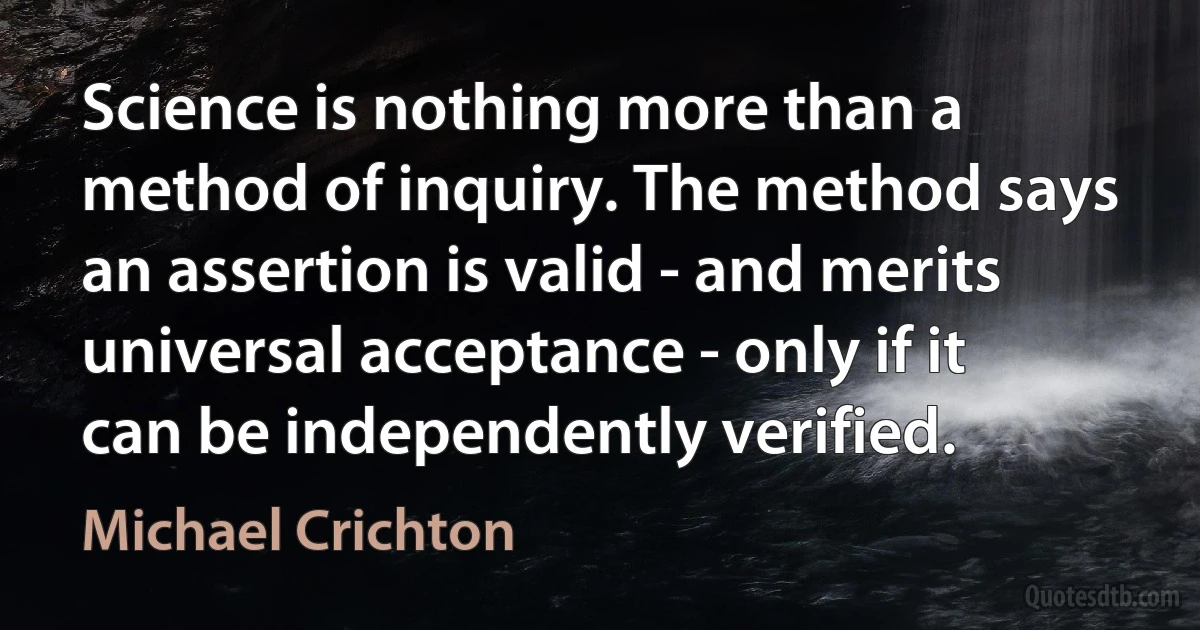Verified Quotes - page 2
As to Bonaparte, you know what my apprehensions always were, and I can not help thinking they are in a great degree verified. For though he may, and I hope he will, trounce the Austrians...yet it is impossible to deny that he has lost, or at least risqued the losing of an opportunity. Every man has his weak side, and I have always thought Bonaparte's was the thinking Austria more inclined to peace and more to be depended upon than She is. I hope to God he will not suffer from his errour.

Charles James Fox
If religious liberty includes, as it must, the right to communicate such experiences to others, it seems to me an impossible task for juries to separate fancied ones from real ones, dreams from happenings, and hallucinations from true clairvoyance. Such experiences, like some tones and colors, have existence for one, but none at all for another. They cannot be verified to the minds of those whose field of consciousness does not include religious insight. When one comes to trial which turns on any aspect of religious belief or representation, unbelievers among his judges are likely not to understand, and are almost certain not to believe, him.

Robert H. Jackson
While we were never able to provide 100 percent certainty regarding the disposition of Iraq's proscribed weaponry, we did ascertain a 90-95 percent level of verified disarmament. This figure takes into account the destruction or dismantling of every major factory associated with prohibited weapons manufacture, all significant items of production equipment, and the majority of the weapons and agent produced by Iraq.

Scott Ritter
Among the many things that I showed Sir John while at Hammerfield, was a piece of white calico on which I had got printed one million spots. This was for the purpose of exhibiting one million in visible form. In astronomical subjects a million is a sort of unit, and it occurred to me to show what a million really is. Sir John was delighted and astonished at the sight. He went carefully over the outstretched piece with his rule, measured its length and breadth, and verified its correctness.

James Nasmyth
[W]hen a body has experienced any changes, and when after a certain number of transformations it returns to precisely its original state, that is, to that state considered in respect to density, to temperature, to mode of aggregation-let us suppose, I say, that this body is found to contain the same quantity of heat that it contained at first, or else that the quantities of heat absorbed or set free in these different transformations are exactly compensated. This fact has never been called in question. It was first admitted without reflection, and verified afterwards in many cases by experiments with the calorimeter. To deny it would be to overthrow the whole theory of heat to which it serves as a basis. For the rest, we may say in passing, the main principles on which the theory of heat rests require the most careful examination. Many experimental facts appear almost inexplicable in the present state of this theory.

Nicolas Léonard Sadi Carnot
If a prophecy is to be called infallible, I fairly demand that it should state beforehand legibly, clearly, and distinctly that which no man could previously have known, and that the same should thereafter take place at the time appointed, but that it should not take place because it has been predicted. If, however, such a prophecy can only be verified through allegorical interpretations of words and interpretation of words and things; if it be only composed of dark and dubious words, and the expressions it contains are commonplace, vague, and uncertain; if the matter was thought probable, or was foreseen by human cunning; if it occurs because it was predicted; if the words used refer to some other matter and are only applied to the prophecy by a quibble; if it is only written down after the event has occurred; if a prophetic book or passage is given out to be older than it is; or lastly, if the thing predicted does not take place at all, then the prophecy is either doubtful or false.

Hermann Samuel Reimarus
Semiotic itself neither rests on nor necessarily implies a particular philosophy. A science of signs no more decides between an 'empirical' and a 'non-empirical' philosophy than it decides between a 'naturalistic' and a 'supernaturalistic' religion. In itself it cannot force one to believe only scientifically verified statements, nor to use only scientific discourse, nor to form one's appraisals and prescriptions in the light of science. It will nevertheless have a profound influence on the course of philosophy, since it deals with topics peculiarly relevant to philosophic systematization... In this sense, the philosophy of the future will be semiotically oriented. But the nature of this influence will not always be the same, and will depend upon the role which given individuals and societies assign to scientific knowledge.

Charles W. Morris
Doniger's school of scholarship universalizes Freudian methodologies and pathologies, and combines them with obscure Indic materials to weave wild theories about Indian culture. Indians advocating Freudian psychoanalysis have simply accepted and mimicked the Western theories without independently verified clinical and empirical data to establish their applicability in Indian contexts.

Wendy Doniger



